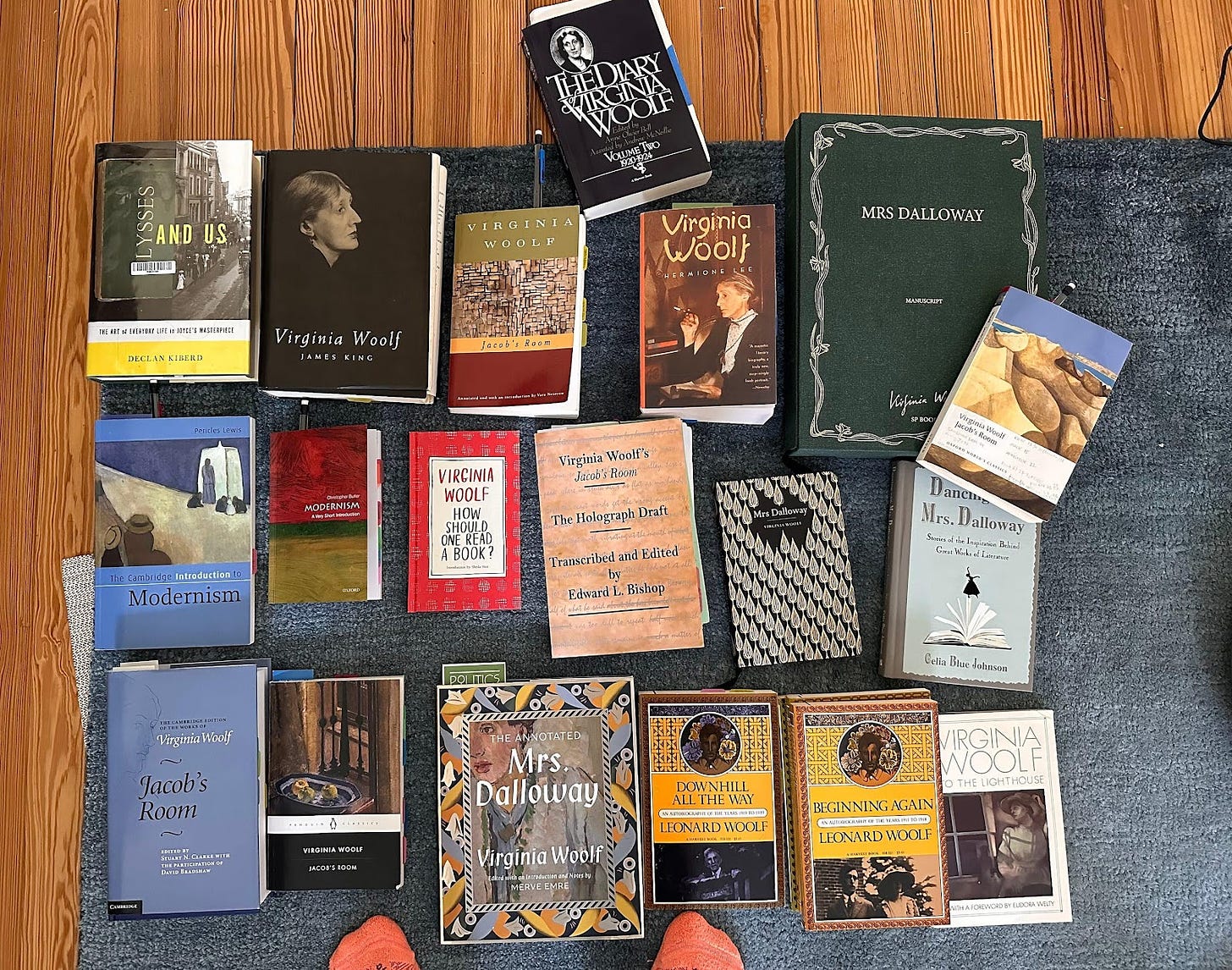“Any criticism of her book even by the most negligible nitwit gave Virginia acute pain,” Leonard Woolf wrote. “It is therefore hardly an exaggeration to say that the publication of a book meant something very like torture to her.”
Leonard Woolf was Virginia Woolf’s husband, as well as her partner in running the Hogarth Press, which published nearly all of her books. Thus, he had a unique vantage point to observe her rising dread during the late stages of each book.
When it came time to start revising one of her novels, Virginia wrote in her diary:
“…after this one day’s respite, I say, I must begin at the beginning and go through 600 pages of cold proof. Why, oh why? Never again, never again.”
And yet, she did it again, and again.
But how did she bring herself to do it? As I anxiously start in on writing my third book, I’ve been reading Virginia Woolf’s diaries, and drawing inspiration from her perseverance.
As Woolf neared the publication of a book, she would start using her diary to try to steel herself for the impending criticism. She tells herself, in writing, that the work isn’t perfect, but that she did something bold and new and can use it going forward; she writes out some of the inevitable insults that will come, as if dealing with them preemptively; she records Leonard’s critiques but also that he told her she has done something of genius. Privately, in her diary, she would build herself up. She would remind herself why she was doing this despite the pain, and she would believe Leonard and others who believed in her. Then she would say to the critics, essentially (if only half-convincingly): “I’m ready. Bring it on.”
In his autobiography, Leonard Woolf compares Virginia’s work to that of other writers who have felt “the horror of facing those pages of ‘cold proof’ and, even more, the cold breath of criticism in the first days after publication.” He singles out one of his friends, Desmond MacCarthy, who “never wrote the novel which, when he was a young man, we thought he would write and which he intended to write, [because] he could not face the horror of the final day when the book and the author are handed over to the icy judgment of the reviewers and the public.” (MacCarthy, instead, became a famous literary critic.)
To explain what separated Virginia from Desmond, Leonard recounts the ancient Greek story of Hippoclides. In a nutshell: After outcompeting other suitors for the hand of a ruler’s daughter, Hippoclides has his victory revoked when he gets out of hand and starts dancing on his head on a table at a celebratory feast. You have just “danced away your marriage,” the ruler tells him. To which Hippoclides replies: “Hippoclides doesn’t care.” The retort became a Greek wisecrack.
Here, again, is Leonard Woolf:
“Despite her terrifying hypersensitivity, there was in Virginia an intellectual and spiritual toughness which Desmond lacked…The consequence was that the moment always came when she stiffened against the critics, against herself, and against the world; ultimately she had the courage of her convictions and published, saying — not with much conviction — ‘Virginia doesn’t care’. And that was why, unlike Desmond, she had published, when she died, seventeen books.”
Three of those books, according to thegreatestbooks.org, are among the 100 greatest novels ever written.
Reading Leonard’s memories and Virginia’s diaries made me think of psychologist Brian Little’s concept of “free traits.” The idea of “free” personality traits is that, while you undoubtedly have certain fixed proclivities, you can overcome them when something is important to you — a “core project.”
Little himself is an avowed introvert (he’s actually a character in Susan Cain’s great book Quiet), but he’s also a beloved teacher and passionate public speaker. In other words, he is able to play an extrovert temporarily when it matters to him (even if he would often hide in the bathroom after a lecture to recharge). As Little put it: “The free trait of, in my case, pseudo-extroversion plays out by advancing my core project, which is engaging with my students, whom I love.”
When I think of “Virginia doesn’t care” through the frame of free traits, it’s not so much that Virginia actually doesn’t care about critics, but that she cares so deeply about her core project that the inevitable criticism looks small in comparison.
I’m hoping to channel a bit of half-convincing “David doesn’t care” for my new project. Once in a while, I expect we could all benefit by tapping our inner Virginia for core projects.
I’m often asked questions about book research, and each project is so idiosyncratic that I rarely have straightforward answers. But I definitely over-collect books and papers on topics I’m interested in, make notes in them, and then repeatedly go back and peruse those notes as I learn. (I like Readwise for doing this with ebook notes; I’m in no way affiliated with Readwise, I just like the app.) Here’s a picture of my burgeoning Woolf collection (and my sweet socks).
I also just had an excellent research trip to the New York Public Library, where I was allowed to spend the day with some of Woolf’s actual notebooks. Thank you to the wonderful staff of the Berg Collection of English and American Literature! You wouldn’t believe some of the stuff they have at the NYPL, like pieces of Percy Shelley’s skull, collected from his funeral pyre and currently on display.
Finally, thank you for reading. And welcome to a bunch of new subscribers, including a few who volunteered to support this newsletter through paid subscriptions. I rarely have any idea what causes the occasional bounce in subscribers to Range Widely (although the recent “Christmas tree effect” post was unusually popular), but I’m thrilled that you’re here, and it motivates me to keep this thing going.
Until next time…
David
P.S. If you enjoyed this post, please share it.
P.P.S. If a friend sent this to you, you can subscribe here.








Makes me think: Virginia would have liked The Honey Badger. As in “HB don’t give a S*it.” I’d add the link but it’s an R-rated video (and a lowbrow version of your message David). Good luck with your next book. The others have more than weathered the critics.
This is a beautiful post David. Excited that you are embarking on another book. Be bold!
And... I think that Quite is the most important book I've ever read by the measure of how much a book has shaped my understanding of myself. Range gives me faith that I'm going to make a bunch of the threads of my life come together at some point, but Quite let me accept myself.